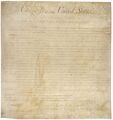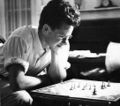Template:Selected anniversaries/September 25: Difference between revisions
Jump to navigation
Jump to search
No edit summary |
No edit summary |
||
| Line 1: | Line 1: | ||
<gallery> | <gallery> | ||
File:Ole Rømer.jpg|link=Ole Rømer (nonfiction)|1644: Astronomer and instrument maker [[Ole Rømer (nonfiction)|Ole Rømer]] born. He will make the first quantitative measurements of the speed of light. | |||
||1777 – Johann Heinrich Lambert, Swiss mathematician, physicist, and astronomer (b. 1728) | |||
File:Bill of Rights.jpg|link=United States Bill of Rights (nonfiction)|1789: The United States Congress passes twelve amendments to the United States Constitution: The Congressional Apportionment Amendment (which was never ratified), the Congressional Compensation Amendment, and the ten that are known as the [[United States Bill of Rights (nonfiction)|Bill of Rights]]. | File:Bill of Rights.jpg|link=United States Bill of Rights (nonfiction)|1789: The United States Congress passes twelve amendments to the United States Constitution: The Congressional Apportionment Amendment (which was never ratified), the Congressional Compensation Amendment, and the ten that are known as the [[United States Bill of Rights (nonfiction)|Bill of Rights]]. | ||
File:Judge Havelock With Glass.jpg|link=Judge Havelock With Glass|1845: ''[[Judge Havelock With Glass]]'' is "a reasonably accurate depiction of events as I experienced them," according to [[Judge Havelock|the Judge]]. | File:Judge Havelock With Glass.jpg|link=Judge Havelock With Glass|1845: ''[[Judge Havelock With Glass]]'' is "a reasonably accurate depiction of events as I experienced them," according to [[Judge Havelock|the Judge]]. | ||
||1866 – Thomas Hunt Morgan, American biologist, geneticist, and embryologist, Nobel Prize laureate (d. 1945) | |||
||1893 – Harald Cramér, Swedish mathematician and statistician (d. 1985) | |||
||1906 – In the presence of the king and before a great crowd, Leonardo Torres y Quevedo successfully demonstrates the invention of the Telekino in the port of Bilbao, guiding a boat from the shore, in what is considered the birth of the remote control. | |||
||1915 – Ethel Rosenberg, American spy (d. 1953) | |||
||1928 – Richard F. Outcault, American cartoonist, created The Yellow Kid and Buster Brown (b. 1863) | |||
||1929 – Jimmy Doolittle performs the first blind flight from Mitchel Field proving that full instrument flying from take off to landing is possible. | |||
||1956 – TAT-1, the first submarine transatlantic telephone cable system, is inaugurated. | |||
||1968 – Hans F. K. Günther, German eugenicist and academic (b. 1891) | |||
||1986 – Nikolay Semyonov, Russian physicist and chemist, Nobel Prize laureate (b. 1896) | |||
||1992 – NASA launches the Mars Observer, a $511 million probe to Mars, in the first U.S. mission to the planet in 17 years. Eleven months later, the probe would fail. | |||
File:George Plimpton 1993.jpg|link=George Plimpton (nonfiction)|2003: Journalist, writer, literary editor, and actor [[George Plimpton (nonfiction)|George Plimpton]] dies. | File:George Plimpton 1993.jpg|link=George Plimpton (nonfiction)|2003: Journalist, writer, literary editor, and actor [[George Plimpton (nonfiction)|George Plimpton]] dies. | ||
Revision as of 17:10, 14 August 2017
1644: Astronomer and instrument maker Ole Rømer born. He will make the first quantitative measurements of the speed of light.
1789: The United States Congress passes twelve amendments to the United States Constitution: The Congressional Apportionment Amendment (which was never ratified), the Congressional Compensation Amendment, and the ten that are known as the Bill of Rights.
1845: Judge Havelock With Glass is "a reasonably accurate depiction of events as I experienced them," according to the Judge.
2003: Journalist, writer, literary editor, and actor George Plimpton dies.
2004: Physicist and crime-fighter Gordon Gould demonstrates new type of quantum laser which detects and isolates crimes against mathematical constants.




